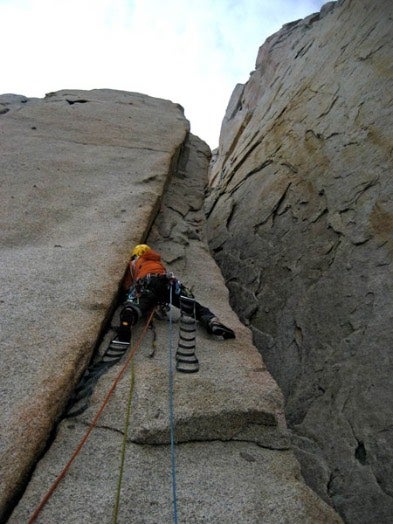“], “filter”: { “nextExceptions”: “img, blockquote, div”, “nextContainsExceptions”: “img, blockquote, a.btn, a.o-button”} }”>
Heading out the door? Read this article on the new Outside+ app available now on iOS devices for members!
>”,”name”:”in-content-cta”,”type”:”link”}}”>Download the app.
Cristian Brenna, 54, a distinguished Italian alpinist, extremely talented rock climber, and mountain guide, tragically died on June 3, 2025, after an accident on Mount Biaina, near Arco. Around 11 a.m., while traversing a ridge at 1,350 meters (approximately 4,430 feet) with a companion, Brenna reportedly stumbled on the trail, slid down a wooded slope, and landed on rocks below. His companion, unable to reach him, alerted emergency services.
Swift rescue efforts involving an emergency helicopter, local Alpine Rescue, and colleagues from the Soccorso Alpino della Guardia di Finanza (SAGF) where Brenna served, were deployed. Despite attempts to revive Brenna by the medical team, his death was confirmed at the scene. This sudden and unexpected loss, occurring not during an extreme ascent but a non-technical descent, reminds us of the inherent risks in mountain environments, even for the most experienced.
Born in Bollate on July 22, 1970, Cristian Brenna started sport climbing at 15, joining the World Cup circuit in 1991. He achieved significant competitive success, including a World Cup Lead victory in Courmayeur (1998) and multiple podium finishes, reaching second overall in 1998 and third in 1996 and 2000. He also earned two European Lead silver medals (1998, 2000) and a Speed silver (1992), showcasing remarkable versatility. Domestically, he was a three-time Italian champion.
In 2005, Brenna retired from competitions to focus on exploratory alpinism. This transition from structured competition to the uncertainties of high-altitude challenges was a notable shift, but not a surprise for his partners. His first major endeavor was the “UP-Project” in Pakistan in 2005, where he opened and freed Up & Down (7c/5.12d) on the Chogolisa Shield at 5,000 meters (approximately 16,400 feet).
In 2003, he completed the first free ascent of Itaca nel Sole (8b/5.13d trad) in Valle dell’Orco. He also climbed Bellavista (8b+/5.14a; 450m) on the Tre Cime di Lavaredo with Mauro “Bubu” Bole in 2002. In February 2008, with Hervé Barmasse, he made the first ascent of La Ruta del Hermano (A3 6b+/5.10d; 850m) on the previously unclimbed Northwest Face of Cerro Piergiorgio in Patagonia, solving a long-standing alpine problem.
Beyond his climbing career, Brenna was a mountain guide (Guida Alpina), a rescuer with the Soccorso Alpino della Guardia di Finanza, and a national team coach for the Italian Sport Climbing Federation. He was also a member of the famous climbing club Ragni di Lecco.
He found mountains to be “Divertimento, passare bei momenti con gli amici e vivere esperienze intense” (fun, spending good moments with friends, and having intense experiences), emphasizing that true alpinists needed “La completezza e la polivalenza” (completeness and versatility). For Brenna, success was deeply personal, about feeling good about himself, not merely external recognition.
He leaves behind his wife, Jana, and children, Filippo and Sofia, the latter being a national climbing champion.
Cristian Brenna is remembered not only for his extraordinary climbing prowess but equally for his profound human qualities. He was described as an “inspiration, a symbol of pure passion, quiet strength, and dedication.” Online, friends and colleagues consistently highlighted his “perennial smile” and “joy for life,” describing him as “polite, sensitive, ironic, and humble.”

I reached out to veteran climber Riki Felderer, a close friend, who expressed the profound void left by Brenna’s passing. Felderer struggled to find words that weren’t clichés to describe him, believing “a book wouldn’t be enough to tell his story.” This story, he felt, would be “made of anecdotes, great deeds, and small stupidities that would describe a special man, far from perfect, as in reality no one is!” But most importantly, “he was a friend.”
Fabio Palma, former Ragni di Lecco President, recalled Brenna’s immediate, friendly greetings. Palma says Brenna was known for his strong ethical principles, including a disdain for “meritocratic injustices and complaining about fatigue.”
Lucia Furlani, a young climber he coached, described him as “much more” than a coach—”a guide, a concrete example to follow, a point of reference.” His ability to listen and support built a “true, sincere bond.” Through his teachings, he instilled “grit and desire,” encouraging them to win “those [battles] against ourselves.” Brenna’s strength, they affirmed, would live on “in every beat of our heart.”
Federico Bernardi thanks Riky Felderer, Fabio Palma, GognaBlog, and Lo Scarpone.
